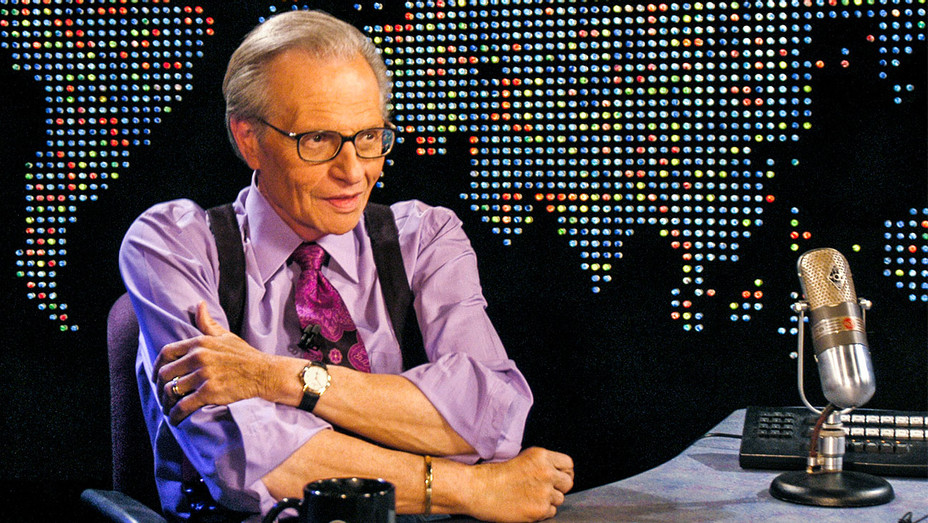Even before there was a CNN, the world knew Larry King.
Eventually, they would entwine. For 25 years, King – who died Saturday at 87 – hosted a weeknight talk show (shown here) on CNN; at times, he was the most prominent piece of an obscure network.
“Larry King really made CNN,” anchorman Wolf Blitzer said during its coverage of King on Saturday.
That was true internationally, reporter/anchor Christiane Amanpour said on CNN: “Everyone watched Larry King.”
But his arrival there in 1985 came after struggles to decide what a news network is.
The original plan was to have specialties – business at 7 p.m., sports at 7:30, hard news at 8, an interview hour at 10 and, later, a 1 a.m. Hollywood show called “People Tonight.”
King was only considered for that last one, Reese Schonfeld, who co-founded CNN with Ted Turner, wrote in “Me and Ted Against the World” (HarperCollins, 2002): “I felt … Larry King was the best of the celebrity interviewers, but not as strong for hard news.”
Then who would host that interview hour? Schonfeld wrote that there were mistakes by him – he rejected Atlanta anchor Forrest Sawyer (“I was snobbish and dumb”) and never looked at the tape of Oprah Winfrey … and by Tom Snyder’s agent, who kept being elusive … and by Geraldo Rivera.
Given an offer that included options on the stock of parent-company TBS, Schonfeld said, Rivera went to ABC for more money. Later, the stock would have been worth $180 million.
Schonfeld tried to get Linda Ellerbee or Jim Lehrer, then chose Chicago talk host Sandi Freeman.
She was smart and skilled, he wrote, but she clashed with his view of fluid plans. “She wanted ‘big names’ on her program, pre-booked, uncancellable. If the U.S. had declared war and Sandi had booked Eddie Fisher, Sandi would have insisted on sticking with Fisher.”
He tried to fire her in 1982 and even signed her replacements, the duo of Tom Braden and Pat Buchanan. Turner refused, giving those two a lesser slot … where their “Crossfire” became a hit. He fired Schonfeld and kept Freeman for three more years.
Then King – already a radio star – was hired. A hard-working guy who had grown up on welfare after his father died when he was 9, King had skipped college and moved to Miami to pursue radio. Decades later, in 1978, he started an all-night radio show – interviews plus call-in – that eventually reached 500 stations. He added CNN in 1985, yet continued to do radio until ‘94.
King refused to research people he was interviewing. He wanted to be surprised, he said.
“He was always interested …. He was the most curious man I’ve ever known,” author/philosopher Deepak Chopra, a frequent guest, said during CNN’s coverage Saturday.
That seemed to work. King gave his guests the room and the time they needed.
As Schonfeld put it: “The line is: You go on the Larry King show and interview yourself, or you can go on Charlie Rose and listen to him interview himself.”
King became what Schonfeld – no longer at the network – had envisioned: a talk host who would shift gears quickly. From O.J. Simpson to Iraq to 9/ll, he did the key nightly interviews.
When he left in 2010, CNN tried to go the opposite way: Piers Morgan would do carefully prepared, richly researched profile/interviews, starting with one on Winfrey.
Ratings weren’t the same. Three years later, Morgan was gone and the network went with an approach that is faster and newsier and — during the Trump years – angrier. The ratings kept increasing.
King kept doing interviews for streaming and online services. Last year, he was interviewed by Tiffany Woolf for “Dispatches From Quarantine,” a non-profit service.
“My endless search to learn more never left me,” he said. “I’m insatiably curious.”
That was in April, when King – who had filed for divorce from his seventh wife the previous year – was quarantined with his son Chance. In December, he was hospitalized for COViD; there was no immediate word on his cause of death, a month later.
